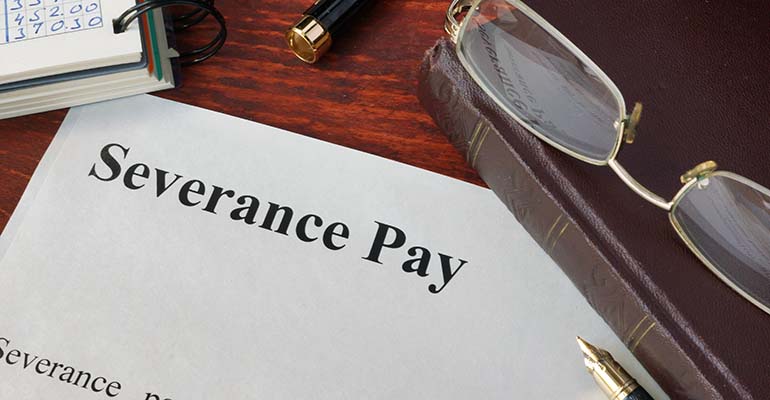
How Does Severance Pay Work in Florida?
Have you been permanently laid off or terminated from your job, or do you think it will happen in the near future? If so, you probably have multiple questions, such as:
- “Will I receive severance pay?”
- “How does severance pay work?”
- “When is severance paid out?”
- “How much severance should I expect to get?”
When losing your job, it is important to understand how severance pay works, if you are eligible, and if you possibly have a case against your former employer.
Understanding How Severance Pay Works
Severance pay is offered in a variety of ways. Some employers will offer severance to workers in a lump sum, others choose to send it in a series of severance checks, and other alternatives may include a continuation of certain benefits that you had while you were employed or other forms of payment.
Just because you are permanently laid off or fired, that does not mean you will automatically receive a severance package. There is no requirement in the Fair Labor Standards Act (FLSA) for severance pay, and some employers will offer it – others will not.
Who Is Eligible for Severance Pay?
It is always difficult to lose a job, and severance pay serves to help offset the lost wages due to layoffs or terminations that were not based on performance, or in some circumstances to resolve outstanding issues or claims between an employee and the employer. Circumstances that are typical for the offering of severance include organizations that are “downsizing” or “restructuring” to save money or due to a reduction in business or profits.
When there are mass layoffs, employees have some protections under federal law. The Worker Adjustment and Retraining Notification (WARN) Act is in place to protect employees of medium to large-sized businesses – those with 100 employees or more. It requires those employers to give their workers at least a 60-day notice before a mass layoff or plant closing. Employees of these companies are entitled to 60 days of pay under the WARN Act if the company does not give the legally required notice.
Some companies have specific policies for severance, which could include certain conditions for payment to employees, and may range from how the severance is paid out, what groups may qualify (such as salaried or hourly workers), and/or the right to modify an agreement.
If you have an employment contract or a collective bargaining agreement that was negotiated by a union, severance pay may be part of those types of contracts.
How Much Severance Pay Should I Get?
Common questions about severance pay are how much you will get and when severance is paid out.
Often, the total amount will be connected to the length of time the employee was with the company before the termination or layoff. There is no definitive standard, and the amount that is paid often varies by industry. Generally speaking, if you haven’t been with the company for a very long time, there will not be much, if any, severance. Typical ranges include:
- Less than 1 year = between 2 to 4 weeks of pay
- Less than 2 years = between 3 to 8 weeks of pay
- Less than 3 years = between 4 to 12 weeks of pay
- Less than 4 years = between 5 to 16 weeks of pay
- Less than 5 years = between 6 to 20 weeks of pay
- Less than 6 years = between 7 to 24 weeks of pay
- More than 6 years = between 8 to 28 weeks of pay
As you can see, there are wide ranges of severance pay. Additionally, there are other factors to consider. If you are offered a lump sum payment, which is the full severance all at once, you may have to pay increased taxes because it could place you in a higher income bracket. An employer may also stop any benefits you had (such as health insurance) when a lump sum payment is accepted. It may be in your best interests to delay some of the severance pay to get the most out of your package. However, “salary continuation” plans carry other risks and must be carefully evaluated if options are, in fact, offered to you.
An employment lawyer can aggressively negotiate with the company — and you may be entitled to more than you think, depending on your length of service.
Why Some Companies Offer Severance and Others Do Not
Companies take different approaches to severance pay. It is often used to create a smooth transition for their business. They are not necessarily doing it to be nice; they are often just looking at the bottom line. Some companies will not have a policy for severance, period. Or it may be in their policy that severance may be available on a case-by-case basis.
Depending on your length of service and employment record, you may be able to negotiate severance even if your employee is not officially offering you (or other co-workers) a severance package.
There will often be conditions listed in severance packages, such as requiring the employee to not say anything disparaging about the company, requiring a release of all potential claims so the employee may not pursue legal action, or limiting your ability to work for competitors.
One of the most important things to understand is that you do not have to accept what is initially offered to you in a severance package. Also, even if you are not directly offered one — that does not automatically mean you cannot receive one.
What Should I Do If I Do Not Receive My Severance Pay?
If you have not received your severance pay or are currently being offered a severance package, it is advisable to consult with an employee rights attorney. Lawyers specializing in employment law have the knowledge, skills, and abilities to lead as your advocate in negotiations for a fair severance package.
When facing the challenges of a mass layoff or other situation with severance pay, you do not have to deal with your employer on your own. This time of transition to the next path in your career is crucial. Wenzel Fenton Cabassa, P.A. is here to help you get the best outcome possible for your severance package. Contact us today to schedule a free, confidential consultation.
Please Note: At the time this article was written, the information contained within it was current based on the prevailing law at the time. Laws and precedents are subject to change, so this information may not be up to date. Always speak with a law firm regarding any legal situation to get the most current information available.








